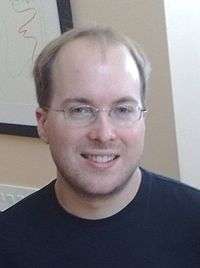Paul Buchheit
| Paul Buchheit | |
|---|---|
 | |
| Nationality | United States |
| Alma mater | Case Western Reserve University |
| Occupation | computer programmer, software developer |
| Known for | FriendFeed, Gmail, one of Google's early employees |
| Website | paulbuchheit.blogspot.com |
Paul Buchheit is an American computer programmer and entrepreneur. He was the creator and lead developer of Gmail. He developed the original prototype of Google AdSense as part of his work on Gmail. He also suggested Google's now-famous company motto "Don't be evil" in a 2000 meeting on company values.[1]
Early life and education
Paul Buchheit grew up in Webster, New York.[2] He attended Case Western Reserve University in Cleveland, Ohio[3][4] where he rowed crew.[5]
Career
Paul Buchheit worked at Intel and later became the 23rd employee at Google. At Google he began developing Gmail in 2001, with its innovations in search and storage. He also prompted what would become AdSense. Leaving Google in 2006, Buchheit started FriendFeed, which was launched in 2007 and was acquired by Facebook in 2009 in a private transaction.[6] In 2010, Buchheit left Facebook to become a partner at the investment firm Y Combinator. From 2006 (when he started investing) until 2008, Buchheit invested about $1.21 million in 32 different companies.[7] He also continues to oversee angel investments of his own in "about 40" startups (by his own estimate).[8]
Honors and Certificates
Paul Buchheit won the 2011 The Economist Innovation Awards for the Computing and telecommunications field.[9]
Other interests
Paul Buchheit has stated that he believes society has the technology and resources to provide adequate food, housing, education, and healthcare for everyone, using only a fraction of available labor and resources. In his view, this implies it is possible to put an end to wage slavery.[10] Buchheit further stated:[10]
I don't have to work. I choose to work. And I believe everyone deserves the same freedom I have. If done right, it's also economically superior, meaning we will all have more wealth. We often talk about how brilliant or visionary Steve Jobs was, but there are probably millions of people just as brilliant as he was. The difference is they likely didn't grow up with great parents, amazing teachers, and an environment where innovation was the norm. Also they didn't live down the street from Steve Wozniak. Economically, we don't need more jobs. We need more Steve Jobs. When we set everyone free, we enable the outliers everywhere. The result will be an unprecedented boom in human creativity and ingenuity.
References
- ↑ "Paul Buchheit on Gmail, AdSense and More". Google Blogoscoped. 2007-07-16. Retrieved 2009-03-03.
- ↑ Mercury News interview: Paul Buchheit, creator of Gmail, venture capitalist - San Jose Mercury News. Mercurynews.com. Retrieved on 2014-03-18.
- ↑ Gmail creator, CWRU Computer Engineering alum Paul Buchheit to deliver his own message at commencement | Electrical Engineering and Computer Science. Engineering.case.edu. Retrieved on 2014-03-18.
- ↑ Partners. Y Combinator. Retrieved on 2014-03-18.
- ↑ Spartan Alumni Rowing Association Members
- ↑ Kincaid, Jason. "Facebook Acquires FriendFeed". TechCrunch.
- ↑ "Angel investing, my first three years". Paul Buchheit's Blog. 2011-01-03. Retrieved 2011-01-03.
- ↑ "Facebook's Paul Bucheit Talks About Facebook, Google, and His New Gig". The Los Angeles Times. 2010-11-12. Retrieved 2010-11-14.
- ↑ "Monitor And the winners were… Innovation awards: Our annual prizes recognise successful innovators in eight categories. Here are this year’s winners", The Economist, 3 Dec 2011.
- 1 2 Paul Buchheit Talk at Startup School Europe 2014, London, UK.
External links
- Paul Buchheit's blog
- Buchheit's FriendFeed
- Buchheit's Twitter
- "Interview with Buchheit at Facebook", You tube, Google
- Roberts, Russ (September 21, 2009). "Buchheit on Google, Friendfeed, and Start-ups". EconTalk. Library of Economics and Liberty.
- Buchheit's Talk at Stanford University (May 23, 2012). Buchheit discusses his views on the future of technology entrepreneurship and venture capital, and other key aspects of starting a company and building and growing it into a large business, including e.g. the Y Combinator model versus the traditional model for venture capital.